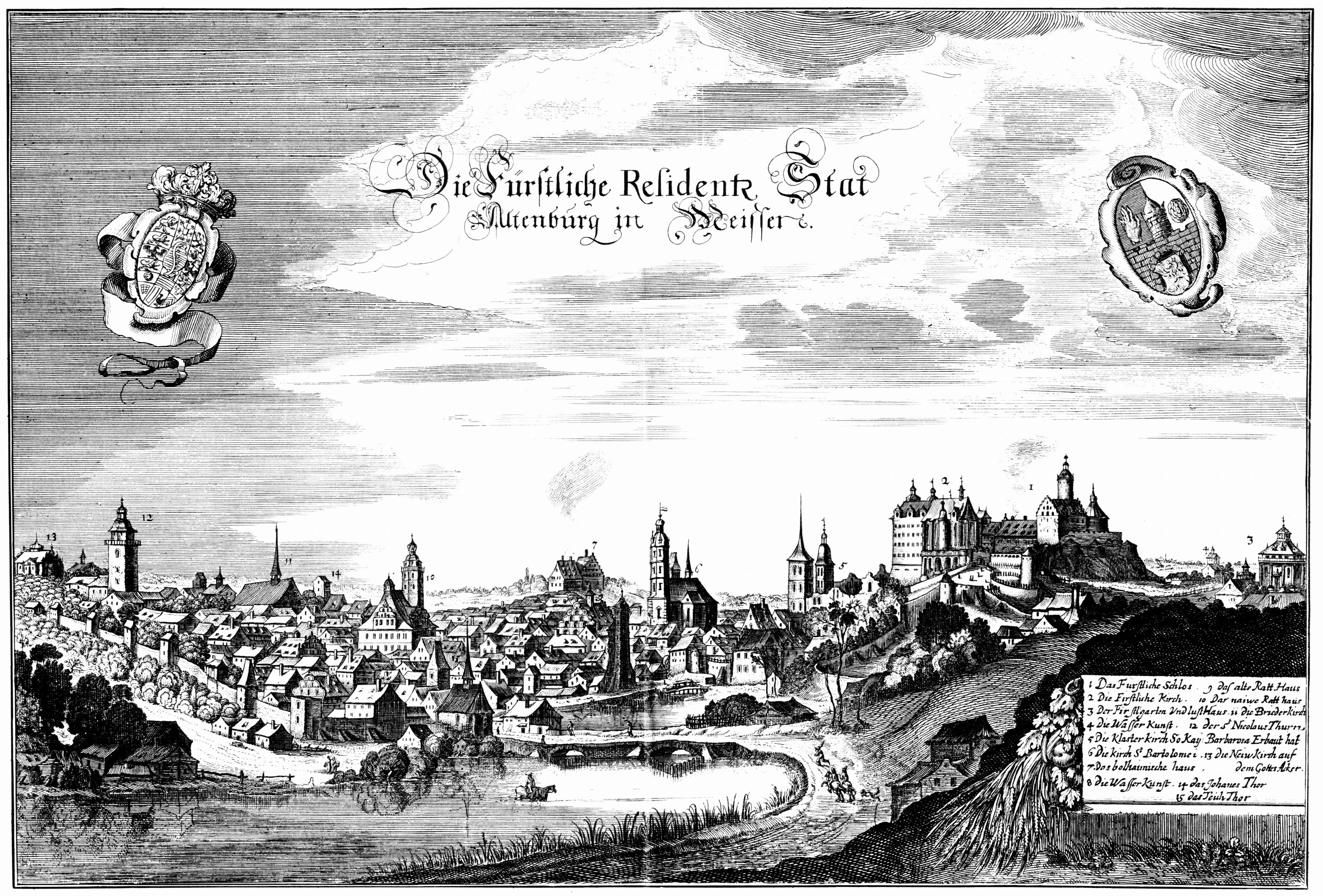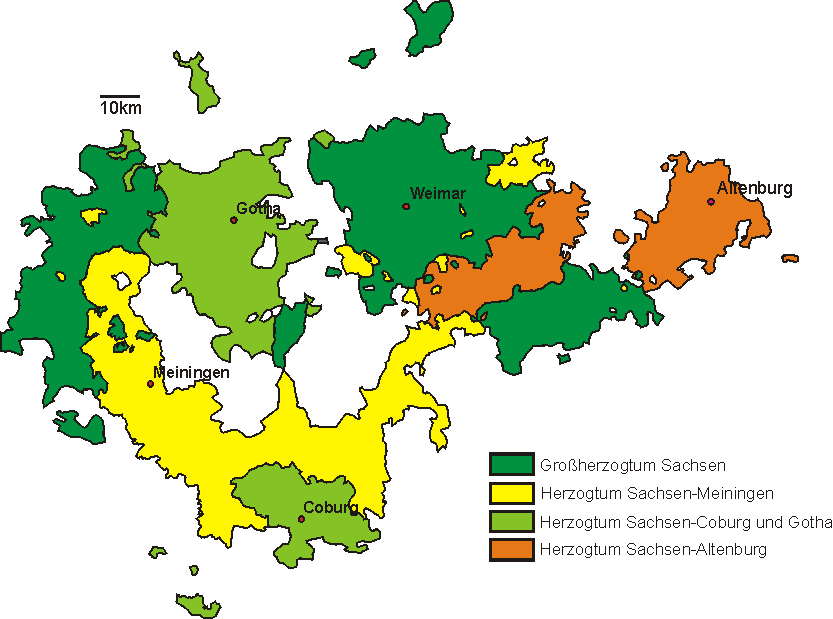|
Altkirchen
Altkirchen is a village and a former municipality in the district Altenburger Land, in Thuringia, Germany. Since 1 January 2019, it is part of the town Schmölln. Geography Neighboring municipalities Communities near Altkirchen are the city of Altenburg, Dobitschen, Drogen, Göhren, Göllnitz, Saara, and the city of Schmölln. Municipal organization The municipality of Altkirchen was divided into 13 districts: *Altkirchen *Gimmel *Gödissa *Göldschen *Großtauschwitz *Illsitz *Jauern *Kleintauschwitz *Kratschütz *Nöbden *Platschütz *Röthenitz *Trebula History Within the German Empire (1871–1918), Altkirchen was part of the Duchy of Saxe-Altenburg. From 1952 to 1990, it was part of the Bezirk Leipzig of East Germany East Germany, officially the German Democratic Republic (GDR; german: Deutsche Demokratische Republik, , DDR, ), was a country that existed from its creation on 7 October 1949 until its dissolution on 3 October 1990. In these years the state .... ... [...More Info...] [...Related Items...] OR: [Wikipedia] [Google] [Baidu] |
Schmölln
Schmölln is a town in Thuringia, Germany, landkreis of Altenburger Land. It lies on the river Sprotte. Geography Neighboring municipalities Municipalities in the district of Altenburger Land neighboring Schmölln include: Starkenberg, Dobitschen, Göllnitz, Göhren, Thuringia, Göhren, Altenburg, Nobitz, the town of Gößnitz, Ponitz, Heyersdorf, Thonhausen, Vollmershain, Posterstein and Löbichau. Subdivisions Schmölln consists of the town Schmölln and 44 local subdivisions (''Ortsteile''): *Altkirchen *Bohra *Brandrübel *Braunshain *Burkersdorf *Dobra *Drogen *Gimmel *Gödissa *Göldschen *Graicha *Großbraunshain *Großstöbnitz *Großtauschwitz *Hartha *Hartroda *Illsitz *Jauern *Kakau *Kleinmückern *Kleintauscha *Kleintauschwitz *Kratschütz *Kummer *Lohma *Lumpzig *Mohlis *Nöbden *Nitzschka *Nöbdenitz *Nödenitzsch *Papiermühle *Platschütz *Prehna *Röthenitz *Schloßig *Selka *Sommeritz *Trebula *Untschen *Weißbach *Wildenbörten *Zagkwitz *Zschernitzsch Histo ... [...More Info...] [...Related Items...] OR: [Wikipedia] [Google] [Baidu] |
Altenburg
Altenburg () is a city in Thuringia, Germany, located south of Leipzig, west of Dresden and east of Erfurt. It is the capital of the Altenburger Land district and part of a polycentric old-industrial textile and metal production region between Gera, Zwickau and Chemnitz with more than 1 million inhabitants, while the city itself has a population of 33,000. Today, the city and its rural county is part of the Central German Metropolitan Region. Altenburg was first mentioned in 976 and later became one of the first German cities within former Slavic area, east of the Saale river (as part of the medieval Ostsiedlung movement). The emperor Frederick I, Holy Roman Emperor, Frederick Barbarossa visited Altenburg several times between 1165 and 1188, hence the town is named a Barbarossa city, Barbarossa town today. Since the 17th century, Altenburg was the residence of different House of Wettin, Ernestine duchies, of whom the Duchy of Saxe-Altenburg, Saxe-Altenburg persisted until th ... [...More Info...] [...Related Items...] OR: [Wikipedia] [Google] [Baidu] |
Drogen
Drogen is a village and a former municipality in the district Altenburger Land, in Thuringia, Germany. Since 1 January 2019, it is part of the town Schmölln. Geography Neighboring municipalities Municipalities near Drogen include Altkirchen, Dobitschen, Nöbdenitz, the city of Schmölln Schmölln is a town in Thuringia, Germany, landkreis of Altenburger Land. It lies on the river Sprotte. Geography Neighboring municipalities Municipalities in the district of Altenburger Land neighboring Schmölln include: Starkenberg, Dobitsche ..., and Wildenbörten. Municipal organization The municipality of Drogen consisted of two subdivisions: Drogen and Mohlis. Trivia Drogen has an unusual name (It means ''Drugs'' in German), which has resulted in its street sign being frequently stolen. References Altenburger Land Duchy of Saxe-Altenburg Former municipalities in Thuringia {{Altenburger-geo-stub ... [...More Info...] [...Related Items...] OR: [Wikipedia] [Google] [Baidu] |
Altenburger Land
Altenburger Land is a district in Thuringia, Germany. It is bounded by (from the west and clockwise) the district of Greiz, the Burgenlandkreis (Saxony-Anhalt), and the districts Leipzig, Mittelsachsen and Zwickau in Saxony. The district is a member of the Central German Metropolitan Region. Geography Altenburger Land is the easternmost district of Thuringia. It is largely agricultural with three quarters of the total area being used for agriculture. In contrast, forests make up only around 10% of the area, especially in the south of the district there are only few forests. This can be explained by a high soil fertility with a Loess-layer of up to 3.5 meters. The main river is the Pleiße, a tributary of the White Elster, crossing the district from south to north. The hilly Osterland constituting the northernmost foothills of the Ore Mountains slopes gently away to the plains of eastern Saxony-Anhalt. History The region on the Pleiße River was part of a huge forest, whe ... [...More Info...] [...Related Items...] OR: [Wikipedia] [Google] [Baidu] |
Thuringia
Thuringia (; german: Thüringen ), officially the Free State of Thuringia ( ), is a state of central Germany, covering , the sixth smallest of the sixteen German states. It has a population of about 2.1 million. Erfurt is the capital and largest city. Other cities are Jena, Gera and Weimar. Thuringia is bordered by Bavaria, Hesse, Lower Saxony, Saxony-Anhalt, and Saxony. It has been known as "the green heart of Germany" () from the late 19th century due to its broad, dense forest. Most of Thuringia is in the Saale drainage basin, a left-bank tributary of the Elbe. Thuringia is home to the Rennsteig, Germany's best-known hiking trail. Its winter resort of Oberhof makes it a well-equipped winter sports destination – half of Germany's 136 Winter Olympic gold medals had been won by Thuringian athletes as of 2014. Thuringia was favoured by or was the birthplace of three key intellectuals and leaders in the arts: Johann Sebastian Bach, Johann Wolfgang von Goethe, and Fried ... [...More Info...] [...Related Items...] OR: [Wikipedia] [Google] [Baidu] |
Germany
Germany,, officially the Federal Republic of Germany, is a country in Central Europe. It is the second most populous country in Europe after Russia, and the most populous member state of the European Union. Germany is situated between the Baltic and North seas to the north, and the Alps to the south; it covers an area of , with a population of almost 84 million within its 16 constituent states. Germany borders Denmark to the north, Poland and the Czech Republic to the east, Austria and Switzerland to the south, and France, Luxembourg, Belgium, and the Netherlands to the west. The nation's capital and most populous city is Berlin and its financial centre is Frankfurt; the largest urban area is the Ruhr. Various Germanic tribes have inhabited the northern parts of modern Germany since classical antiquity. A region named Germania was documented before AD 100. In 962, the Kingdom of Germany formed the bulk of the Holy Roman Empire. During the 16th ce ... [...More Info...] [...Related Items...] OR: [Wikipedia] [Google] [Baidu] |
Dobitschen
Dobitschen is a municipality in the Altenburger Land district, in the far eastern part of Thuringia, Germany. It borders on the municipalities Schmölln, Göllnitz, Mehna and Starkenberg. It is subdivided into the ''Ortsteile'' Dobitschen, Meucha, Pontewitz and Rolika. Historical population Persons *Johann Friedrich Agricola Johann Friedrich Agricola (4 January 1720 – 2 December 1774) was a German composer, organist, singer, pedagogue, and writer on music. He sometimes wrote under the pseudonym Flavio Anicio Olibrio. Biography Agricola was born in Dobitschen, Thu ... References {{Authority control Altenburger Land Duchy of Saxe-Altenburg ... [...More Info...] [...Related Items...] OR: [Wikipedia] [Google] [Baidu] |
Göhren, Thuringia
Göhren is a Municipalities of Germany, municipality in the district of Altenburger Land, in Thuringia, Germany. References Altenburger Land Duchy of Saxe-Altenburg {{Altenburger-geo-stub ... [...More Info...] [...Related Items...] OR: [Wikipedia] [Google] [Baidu] |
Göllnitz
Göllnitz is a municipality in the district Altenburger Land, in Thuringia, Germany Germany,, officially the Federal Republic of Germany, is a country in Central Europe. It is the second most populous country in Europe after Russia, and the most populous member state of the European Union. Germany is situated betwe .... References Altenburger Land Duchy of Saxe-Altenburg {{Altenburger-geo-stub ... [...More Info...] [...Related Items...] OR: [Wikipedia] [Google] [Baidu] |
Saara, Altenburger Land
Saara is a village and a former municipality in the district of Altenburger Land, Thuringia, Germany. History The municipality of Saara was established on January 1, 1996, through the consolidation of the former municipalities Lehndorf (containing the village Saara), Mockern, Podelwitz, Taupadel, and Zehma. Since 31 December 2012, it is part of the municipality Nobitz. References Former municipalities in Thuringia {{Altenburger-geo-stub ... [...More Info...] [...Related Items...] OR: [Wikipedia] [Google] [Baidu] |
German Empire
The German Empire (),Herbert Tuttle wrote in September 1881 that the term "Reich" does not literally connote an empire as has been commonly assumed by English-speaking people. The term literally denotes an empire – particularly a hereditary empire led by an emperor, although has been used in German to denote the Roman Empire because it had a weak hereditary tradition. In the case of the German Empire, the official name was , which is properly translated as "German Empire" because the official position of head of state in the constitution of the German Empire was officially a "presidency" of a confederation of German states led by the King of Prussia who would assume "the title of German Emperor" as referring to the German people, but was not emperor of Germany as in an emperor of a state. –The German Empire" ''Harper's New Monthly Magazine''. vol. 63, issue 376, pp. 591–603; here p. 593. also referred to as Imperial Germany, the Second Reich, as well as simply Germany, ... [...More Info...] [...Related Items...] OR: [Wikipedia] [Google] [Baidu] |
Saxe-Altenburg
Saxe-Altenburg (german: Sachsen-Altenburg, links=no) was one of the Saxon duchies held by the Ernestine branch of the House of Wettin in present-day Thuringia. It was one of the smallest of the German states with an area of 1323 square kilometers and a population of 207,000 (1905) of whom about one fifth resided in the capital, Altenburg. The territory of the duchy consisted of two non-contiguous territories separated by land belonging to the Principality of Reuss. Its economy was based on agriculture, forestry, and small industry. The state had a constitutional monarchical form of government with a parliament composed of thirty members chosen by male taxpayers over 25 years of age. History The duchy had its origins in the medieval Burgraviate of Altenburg in the Imperial Pleissnerland ''(Terra Plisensis)'', a possession of the Wettin Margraves of Meissen since 1243. Upon a partition treaty of 1485, Altenburg fell to Ernst, Elector of Saxony, the progenitor of the Ernestine We ... [...More Info...] [...Related Items...] OR: [Wikipedia] [Google] [Baidu] |


